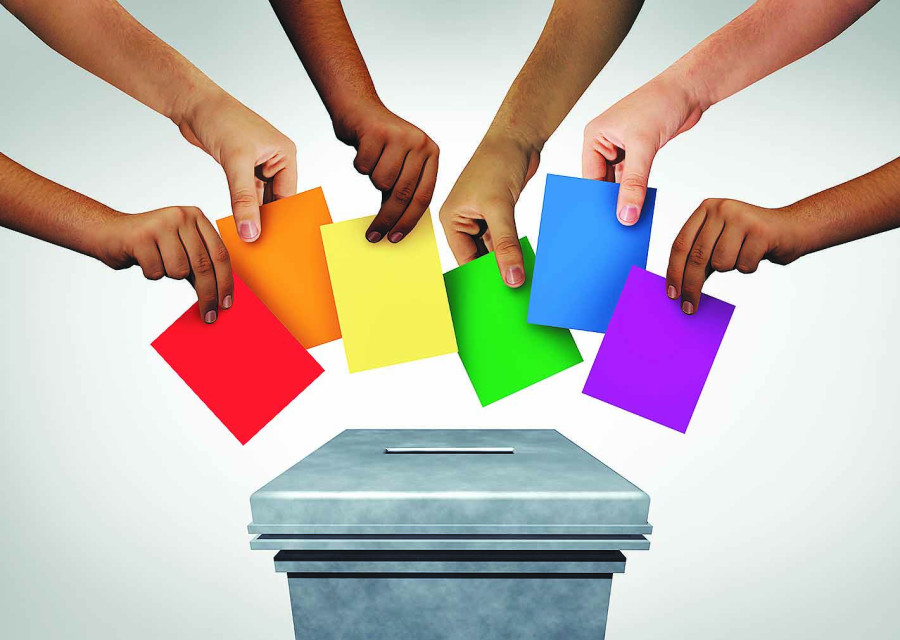National
Transgender people’s qualms continue as Nepal votes in local polls tomorrow
While the Election Commission has taken some steps to try and create a safe voting environment for transgender people, activists say that there is still a lack of nuanced understanding of transgender issues.
Shranup Tandukar
The entire nation is readying itself for Friday’s local elections. However, for transgender people in Nepal, this election is yet another reminder of the government’s inability to properly understand the nuances of the queer community.
Noor KC, a 23-year-old transwoman from Kaski, hasn’t made a voter’s identity card even though she wanted to exercise her franchise. Her citizenship states her gender as ‘male’ and her dead name (dead name is the birth name of a transgender person who has changed their name to reflect their self-determined gender identity). She hasn’t been able to change her name nor gender in her citizenship to date.
“If I had made my voter’s identity card for the upcoming election, then the card would have stated my gender as male,” says KC. “I have faced a lot of problems due to my citizenship and other government documents misgendering me. I don’t want to face similar humiliations in order to vote.”
Other transgender people that the Post spoke to shared that though they have a voter identity card, it doesn’t reflect the gender that they identify with.
The issue of transgender people being misgendered in legal documents and being unable to change their documents isn’t new. While the government acknowledges the existence of the queer population, there is an inclusivity problem in Nepal that surfaces time after time. During the 2021 census, the gender categories were limited to male, female, and others. Young transgender activists had raised the issue of the population belonging to the queer community being forced to select the “others” category even if “they didn’t identify with the gender marker.”
“Our government confuses all LGBTI people as the “third” gender,” says KC. “I am a transwoman, and I want to vote as a woman. The only way for transgender people to have a safe and inclusive voting environment is for provisions to allow us to change our name and gender on our legal documents.”
Rukshana Kapali, a transwoman and trans rights activist, also faced an uncomfortable situation while voting in her local ward in Lalitpur Municipality in the 2017 elections.
“When I went to vote, I had a voter’s identity card as “third” gender, but since there was no separate line besides male and female, I joined the line for females as it is the gender I identify with,” says Kapali. “The officials at the voting booth stared at my card then at me for some time while the people behind were allowed to go ahead and vote without any delay. After the officials discussed amongst themselves for some time, they allowed me to go and vote. It was a humiliating experience for me.”
Kapali is part of the Queer Youth Group, a youth-led network working for sexual orientation, gender identity, and sex characteristics (SOGIESC) rights in Nepal.
Intending to create a safe environment for voting for transgender people, the group had written to the Election Commission (EC) on April 15 this year.
In the letter, the group had urged the EC to allow transgender people to join the gender queue that they identify with and that officials supervising voting booths interact with transgender people with sensitivity and understanding. But the group didn’t receive any response from the EC.
However, in the ‘Local Level Election Directive, 2078’ published by the EC, section 92 states that the election officer needs to prioritise voters from gender and sexual minority groups along with pregnant women, people with disabilities, and sick and old people.
“People who have “third” or “others” gender voter’s identity card will be given priority to vote in the upcoming election,” says Surya Prasad Aryal, information officer and assistant spokesperson of EC. “However, if the person's voter ID doesn’t have “others” or “third” gender, then they will not be given priority and will need to join the gender queue as stated in their voter ID.”
.jpg)
According to the data given by the EC, a total of 17,733,723 people have enrolled themselves on the voter list. Of them, 8,992,010 are males, 8,741,530 are females, and 183 have been registered under the “others” category.
But the perception of the EC, which sees people from gender and sexual minorities as only those who have “others” gender, is yet another instance of ‘forced third gender labelling’, argues Kapali.
Transgender people being viewed as “third” gender or “others” by the government is a common misconception in Nepal. While people from the “third” gender identify themselves as different from the traditional gender binary of male and female, transgender males identify themselves as males and transgender females identify themselves as females.
“In the last election, I was able to join the female voters queue even when I had a voter identity card with “third” gender. But in the upcoming election, people with the “third” gender card might not be allowed to join the queue with the gender that they identify with,” says Kapali.
Pinky Gurung, president of Blue Diamond Society, also faced an uncomfortable situation while going to vote in the 2017 elections. Her voter identity card also states her gender as “third” and there was a moment of confusion as to which queue she should join. Eventually, she joined the female queue as she identifies herself as a female. She also contested the 2017 federal parliament elections as a candidate from the Naya Shakti Nepal Party.
She shares that the problems for transgender people in the election process also extend from voting to candidacy itself.
“The election law itself doesn't explicitly include the “others” term in the criteria for election candidates. Right now, political parties interpret it in their own ways, which means some allow “others” gender to contest for election, while others don’t,” says Gurung. “Our organisation in talks with the officials from the EC had recommended more policy changes to create a safe environment for all LGBTIQ+ members to vote.”
In response to the experiences she faced in the 2017 elections, Kapali submitted a writ petition to the Supreme Court in June 2021 to allow her to change the “third” gender in her voter's identity card. On February 21, 2022, the Supreme Court passed an interim order directing the EC to provide Kapali with a voter identity card that marks her gender as female. A final verdict is pending.
There is no clear legal provision to allow the change in gender in one’s voter identity card, and the interim order by the Supreme Court, which allowed Kapali to do so, was the first instance when the gender identity of a transgender person was legally acknowledged in the binary spectrum.
“Many of my transgender friends are planning not to participate in the upcoming elections because they do not want to face humiliating circumstances due to their gender identity,” says Kapali. “Even though I now have a voter identity card which correctly states my gender, I will not be going to vote in solidarity with the rest of my transgender friends.”




 17.12°C Kathmandu
17.12°C Kathmandu














